I have enjoyed every interview I have conducted with a former Red Sox player. My interview of Bill Monbouquette is near to the top of my most enjoyable sessions.
I interviewed “Mombo” about 25 years ago at Frank’s Steakhouse, a Cambridge institution since 1938. There is nothing pretentious about Frank’s and there was absolutely nothing pretentious about Bill Monbouquette. And I mean that in the very best way!
There was snow on the ground, and a chill the air, but Mombo warmed Franks with 45 years of great baseball memories. And what a passion Bill had for the game, for playing it properly, and for respecting the game he loved.
We had a great conversation, an excellent meal, and Preacher Jack was playing boogie-woogie piano in the background. It really doesn’t get much better than that!
**********************************************************************************************************************************************************************************************
Bill Monbouquette left his Medford, Massachusetts, home on a June day in 1955 for a tryout with the Boston Red Sox at Fenway Park. Forty-five seasons later at the time of our interview, Monbouquette was still playing an important role in professional baseball.
“I remember Ted Williams watched me pitch batting practice, and he said to me afterwards, ‘Hey, I like the way you throw strikes.’ What a thrill that was for a 18-year-old local kid.”
When you check the Red Sox record book for all-time pitching leaders you find that 60 seasons after he threw his last pitch for the Boston Red Sox Bill Monbouquette is still in the top 25 for eight important pitching categories. Among them, he ranks seventh for games started, seventh for innings pitched, and tenth in strikeouts. While those statistics are impressive, they only begin to tell the story of a lifetime of commitment to the game he loved.
THE PRIDE OF MEDFORD, MASS
Bill Monbouquette was born and raised in Medford, MA, where he starred in baseball and hockey. His enthusiasm for both sports goes way back, and he thinks that hockey was probably his first choice as a youngster.
“I loved hockey,” Monbouquette recalls, “but in those days there were only three rinks in the Boston area: the Boston Arena, the Boston Skating Club, and the Lynn Arena. I used to work out with the Bruins when I was pitching for the Red Sox, but they would be up one end of the rink, and I would be down in the other trying to catch up. Boy, did I pick the right sport!” he laughs.
Although his premier pitching seasons were with the Red Sox and he has continued a close relationship with the team even after leaving the organization, Monbouquette grew up as a fan of the Boston Braves. The Braves moved to Milwaukee before the 1953 season, but from 1901 to 1952 Boston was a two-team baseball town.
“The Braves had the ‘Knothole Gang’ for children, and you could get into Braves Field for next to nothing. Kids came from all over Greater Boston to watch the Braves. And I was always a big fan of Warren Spahn. He won more games than any lefthander in baseball history and I used to love to watch him pitch.”
Monbouquette pitched for Medford High School, and played for the local CYO and American Legion baseball clubs. In the summer following his junior year, he was selected to appear in the Hearst All-Star game, featuring the nation’s best high school ball players in New York’s Polo Grounds. When he was named the game’s MVP, he became a certified major league prospect.
Red Sox scout Fred Maguire got him his fateful tryout at Fenway Park. “The funny part of the story is that I almost went to jail instead of to the Red Sox farm system. My mother and father were there to watch me, and a couple of toughs spilled beer all over my mother. I took one look at my father, and he gave me a nod, so we gave the two guys a pretty good going-over.”
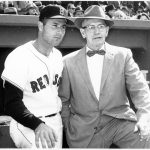
“The next thing I knew, we were both in handcuffs. I said to the cop, ‘could you call Mr. Murphy (Red Sox Minor League Director) upstairs? I’m with the team.’ Thanks to his help, I headed off to the Red Sox farm team in Corning, NY, instead of the Charles Street Jail.”
Monbouquette toiled for parts of four seasons in the Red Sox minor league system. Along the way he played for long-time Red Sox minor league manager Eddie Popowski in Albany, NY, and Gene Mauch at the Red Sox Triple-A farm club in Minneapolis, MN.
LOCAL BOY MAKES GOOD
The pitching-poor Red Sox called up the 21-year-old right-hander in July of 1958. His ability to persevere against big league competition was tested in his first game in the major leagues. He served notice that he was here to stay with a purpose pitch to certified tough-guy Billy Martin.
“I remember my first game was against the Detroit Tigers, and they hammered me pretty good. They scored five runs off of me, and Billy Martin [former New York Yankee player, and later manager], stole home. The next time he came up, I unloaded on him. When he trotted by me on the mound, he said, ‘I guess you owed me that one, Rook!’
The Boston Red Sox of the late 1950s through the mid-1960s bore little resemblance to today’s Red Sox teams. Those teams spent most of the time in the second division of the American League standings, and more of the seats in Fenway Park were empty than occupied. He can remember Fenway Park when you could hear the vendors hawking their wares three sections away.
“We used to average 8,000-10,000 fans a game. Not only could I hear everything the fans yelled, I recognized a lot of the voices. I would hear a fan getting all over me and I would say to myself, ‘Hey, that’s Billy So-and-So from Medford Square.’”
“Mombo,” as he was known to his teammates, established himself as one of the premier pitchers in the American League in 1960. His 14 wins for a seventh-place Red Sox team earned him a spot on the American League All-Star team. On May 7 that year he pitched a one-hitter at Fenway Park in a 5-0 win over the Detroit Tigers. Not only was he selected to the American League All-Star team, but also he was named as their starting pitcher for the July 11 game in Kansas City. In five short years, he had gone from Playstead Park in West Medford, to throwing the first pitch in the mid-summer classic.
“I’ll never forget that game. Willie Mays [former San Francisco Giants Hall of Famer] tripled off of me in the first inning. Then Ernie Banks [former Chicago Cubs Hall of Famer] hit a home run. Somebody said ‘Del Crandall [former Milwaukee Braves catcher] isn’t much of a curveball hitter.’ Boom! He hits a home run off of me. I was shell-shocked.”
“But what I really remember is that night I was sitting all alone in the hotel lobby in New York, and along comes Stan Musial [former St. Louis Cardinals Hall-of-Famer.] He asked me if I had any plans, and when I said ‘no’, he said, ‘come on, let’s go to dinner.’” Years later I told him how much that invitation meant to me, and he responded, ‘Hey Bill, we’re all professionals.’ I wish that all big leaguers had that same professional attitude today.”
ACE OF THE STAFF
In 1961, he won 14 games again, and established a new Red Sox strikeout record, fanning 17 Washington Senators in May. The 17-strikeout-game was quite a feat for a pitcher who was better known for his pinpoint control.
“I wasn’t a strikeout pitcher per se, but that night everything worked for me. The funny thing is I never struck out three of their nine hitters, so I was working the other six hitters pretty good. I struck out Willie Tasby four times, and he never even had a swing off of me!” President Dwight David Eisenhower came down to the clubhouse to congratulate Bill and they traded autographed baseballs! Monbouquette’s 17 strikeouts stood as the Red Sox standard for nearly 25 years, until Roger Clemens struck out 20 Seattle Mariners on April 29, 1986. 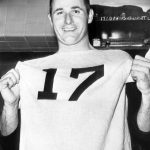
Monbo increased his win total to 15 for the eighth-place 1962 Red Sox, and he was selected once again for the American League All-Star team. He added a no-hitter to his growing list of achievements, defeating the Chicago White Sox 1-0 in a night game at old Comiskey Park.
“The funny part is that I hadn’t been pitching that well before the no-hitter. And what stands out in my mind,” he remembers, “is that we were flying to Chicago, and I was having trouble doing the crossword puzzle. The stewardess came over to see if she could help, and she said ‘Don’t worry about it. You’re going to pitch a no-hitter tomorrow night.’ I had never seen her before, and I never saw her again, but she predicted my no-hitter.”
When the 1962 season came to an end, Mombo ranked fourth in the American League in games started and in shutouts. He led the Red Sox with 11 shutouts and his ERA of 3.33 topped the staff as well.
The 1963 season was the high point of his major league career as he entered the elite 20-game winners circle, achieving All-Star status for the third time. Remarkably, he walked only 42 batters in 258 innings of pitching.
“My control was always good. I always knew how to throw strikes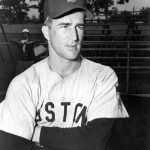 . Of course that meant I got hit a lot, too. Mombo chuckles and adds, “In fact, when I was scheduled to pitch, they used to call the Mass Turnpike and tell them to shut down the Cambridge to Boston extension. They were afraid somebody would get killed by a home run ball I had thrown.”
. Of course that meant I got hit a lot, too. Mombo chuckles and adds, “In fact, when I was scheduled to pitch, they used to call the Mass Turnpike and tell them to shut down the Cambridge to Boston extension. They were afraid somebody would get killed by a home run ball I had thrown.”
Good nature aside, Mombo’s 1963 season was truly remarkable. He won 20 games for a Red Sox team that finished 26 games behind the pennant winning Yankees. And his win total accounted for more than one-quarter of the team’s 76 wins.
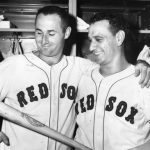
Bill Monbouquette’s win total dropped to 13 in 1964 as the Red Sox fell to eighth place in the American League. In 1965, he won ten games as the Red Sox continued their downward spiral to ninth place. But in both years, he logged well over 200 innings, and walked only 40 batters each season. His outstanding control placed him at the top of all American League pitchers in fewest walks per nine innings pitched in 1964, and second in the league for 1965. Always a workhorse, he led the Red Sox in complete games in both seasons.
TRADE WINDS BLOW
Two days after the close of the Red Sox 1965 season, Monbouquette received a call from then Red Sox General Manager Dick O’Connell telling him that he had been traded to the Detroit Tigers. “I told Dick that I understood completely. It was part of baseball. I had eleven wonderful years with the organization. Mr. Yawkey was the best owner in baseball.”
Monbouquette spent the 1966 season with the Tigers where he split his time between starting and relieving. He began the 1967 season with Detroit, but soon found himself in the pinstripes of the New York Yankees. Asked if that was a strange experience for a Medford boy, he responds, “At first it was, but it was great to be a part of their wonderful baseball tradition. And Ralph Houk [former Yankees manager and Red Sox manger] was the best all-around manager I ever played under.”
One game during the 1967 pennant race stands out in Monbo’s mind. “We [the Yankees] were in ninth place and the Red Sox were fighting for the pennant. I pitched my best game of the season, and we beat them 5-2.” Asked how he felt about beating his old team at Fenway Park in a crucial game, he responds with relish, “It felt great.”
His Yankee career lasted through the middle of the 1968 season, when he was traded to the San Francisco Giants. “The Giants didn’t use me much, but I got to play with Willie Mays, Willie McCovey, Gaylord Perry, and Juan Marichal: all Hall of Famers. It was great experience.”
He tried to catch on with a major league team in the spring of 1969, but failed. After 11 major league seasons, and 114 victories, his pitching days were over.
Bill Monbouquette has an interesting perspective on longevity in the big leagues. “Everybody talks about how hard it is to get to the majors. And believe me, it is. But the really hard part is staying there. Because the minute you make it there, somebody else is waiting to take your job. You have to remember that every single day”
A SECOND CAREER
Bill Monbouquette’s major league pitching career was over, but his career as a coach and instructor was just beginning. And this phase of his professional baseball career began with the New York Yankees.
“In the spring of 1969 Ralph Houk asked me to scout nationally for the Yankees to help them with the June draft, and then they sent me to Johnson City, Tennessee to manage their rookie club.”
In less than one year, Monbo had gone from the major leagues and top-shelf hotels, to the lowest level of the minors and long bus rides. “I had to do everything from ordering the bats, the balls, and the tape, to making the motel reservations. One year I’m doing all of my travel first class and the next thing I know, I’m back to riding in a bus. About the only thing I didn’t do was drive that bus.”
His role with the Yankees was the first of a thirty-five year career as scout, manager and coach at the minor and major league levels. During that time he has been with the Yankees (twice), the New York Mets, the Toronto Blue Jays, and most recently the Detroit Tigers for the past five years.
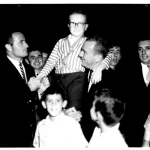
“I’ve done a little bit of everything over the years. I was a pitching coach at the major league level for the Mets in 1982-83. I was Billy Martin’s pitching coach for the Yankees in 1985: now that was an experience!”
Mombo spent the 2004 season as the pitching coach for the Tigers’ short season single-A team in Oneonta, New York. His young pitchers have access to 50 years of baseball experience, and lessons learned at the big league level.
“A couple of years ago, one of my pitchers got beat two nights in a row with his fourth-best pitch. I called him into my office after the second night when he gave up a ‘walk-off’ home run. To emphasize my point, I couldn’t help adding, ‘By the way, that home run sure went far into the night!’ He got a little hot and came back with ‘What do you know about home runs?’ I looked at him and said ‘Son, I gave up 211 home runs in the big leagues.’ He came back the next day and apologized to me.”
Asked what he tells his young pitchers during those conferences on the mound, Mombo chuckles, “I learned from the master, Sal Maglie [former Brooklyn Dodgers pitching star, and Red Sox pitching coach of the 1960s.] Sal used to come out and say ‘Skip doesn’t like what he’s seeing. And he suggests that you get your act together, or he’s going to get somebody else!”
TEAMMATES
When he talks about his baseball career, Bill Monbouquette always comes back to the many teammates he remembers. “Ted Williams was absolutely wonderful. We’re all still in awe of him. Yaz was great. Gene Conley was terrific, and Pumpsie Green was a real pal.”
One of his favorite Yaz stories goes back to the 1960s when the Red Sox used to train in Scottsdale, Arizona. “Willie Mays hit a rocket off me. I mean it cleared the outfield fence at the 350 mark, it soared over the parking lot behind the fence, and it landed beside a swimming pool which was at least 500 feet from home plate. When the ball left the bat, Yaz didn’t even move. Just stood there with his head down, and his hands on his knees.
“I was waiting for him on the top step of the dugout when he came in, and I said ‘Don’t you ever show me up like that again! You can at least make some effort to get back under it.’ He looked me in the eye and said, ‘Bill, I’m not going to play back at the swimming pool.” 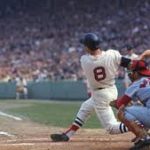
Asked to reflect on his lifetime association with baseball, Monbo answers, “Baseball has been a wonderful experience for me. In fact, it has been everything. I put my heart and soul into it. I had a dream and it came true for me. And nobody, but nobody, ever outworked me on the baseball diamond.”
“All three of my sons are the same way. My oldest son, Marc, is a pilot in the Navy, my next son, Michel, is a captain in the Marines, and my youngest son, Merric, is a logger up in New Hampshire. Nobody outworks them either. They are horses!”
Johnny Pesky was been associated with the Boston Red Sox for over60 years. Asked to put Mombo’s career with the Red Sox in perspective Johnny offers, “I would place Bill in the top five among all the Red Sox pitchers I have seen over the years, and that puts him in some very good company. I managed him in 1963 and 1964, and I still remember how hard he worked. He ran and ran between starts, and that gave him something to draw on in the late innings. He was a very good one.”
BASEBALL PROFESSIONAL
In November of 1997, the City of Medford honored Monbouquette in a ceremony renaming Plastid Park, the baseball park of his youth, as “Bill Monbouquette Field.” Many former Red Sox colleagues including Rico Petrocelli, Dick Radatz, Pesky and Conley were on hand for the dedication.
“It was really a great thrill. They had a nice stone placed there. I just wish I had a dollar for every hour I spent on that field!”
If you were a talented painter you would paint Bill Monbouquette on the pitcher’s mound in Oneonta, New York, lecturing some 19-year-old pitcher on the virtue of first-pitch strikes. If you were a very talented artist, they would hang it in a nationally recognized museum and title it: “Baseball Professional.”
Medford’s own Bill Monbouquette: the consummate baseball professional.
—END—
BY: Herb Crehan



Leave A Comment